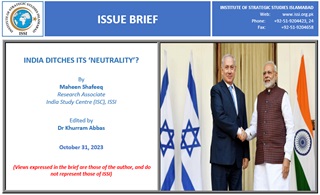Introduction
Within hours of Hamas’ attack on Israel, Indian Prime Minister Narendra Modi made a bold move by expressing his full solidarity with Israel on X (formerly Twitter).[1] India has traditionally projected itself as maintaining ‘neutrality’ and pursuing a ‘non-aligned’ foreign policy, especially during conflicts. However, the ongoing Israel-Hamas conflict has exposed the hollowness of such claims and demonstrated that India is only pursuing its strategic interest, with no regard to its past position of principle or sense of balance.
Many experts argued that there could be a shift in the Indian policy towards Palestine as India has been historically committed to advocating for the rights of the Palestinian people, while others suggested a possibility of alteration in Indian foreign policy of neutrality and non-alignment; however, more evidence supports the notion that India’s so-called neutrality is driven by a rather strategic agenda. Despite an array of diplomatic pressures from the West, New Delhi fought hard to preserve its so-called ‘neutrality’ or ‘strategic autonomy’ on the Russia-Ukraine conflict due it its close strategic, diplomatic, economic and historic ties with Russia. The high bar of strategic ties with Russia, in comparison with Ukraine or the West, was the reason for New Delhi’s rejection of the West’s calls of condemnation of Russia. Somewhat similar hues of kindredness are apparent in the case of New Delhi’s ties with Tel Aviv. Hence, the Indian Prime Minister could not restrain himself from supporting its strategic partner Israel while giving up their so-called ‘neutrality’ as soon as the ‘war’ began between Israel and Hamas.















